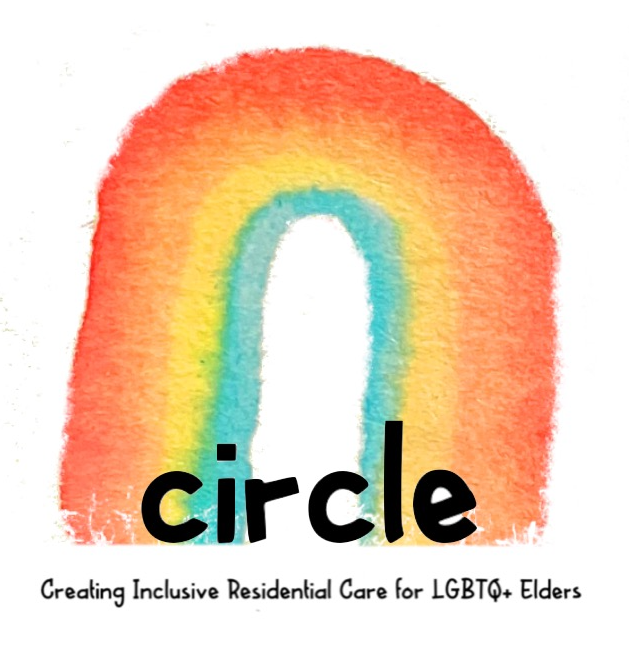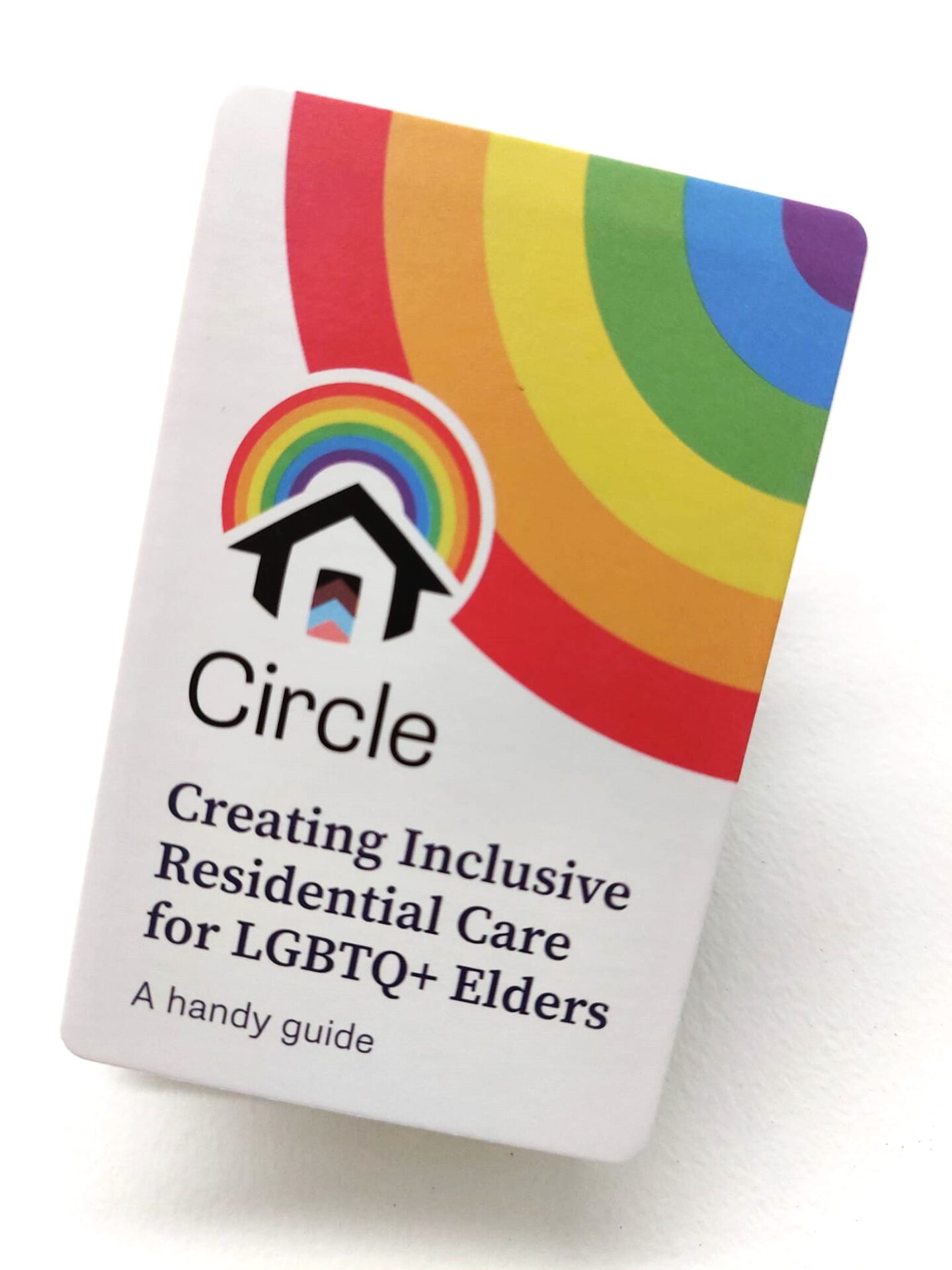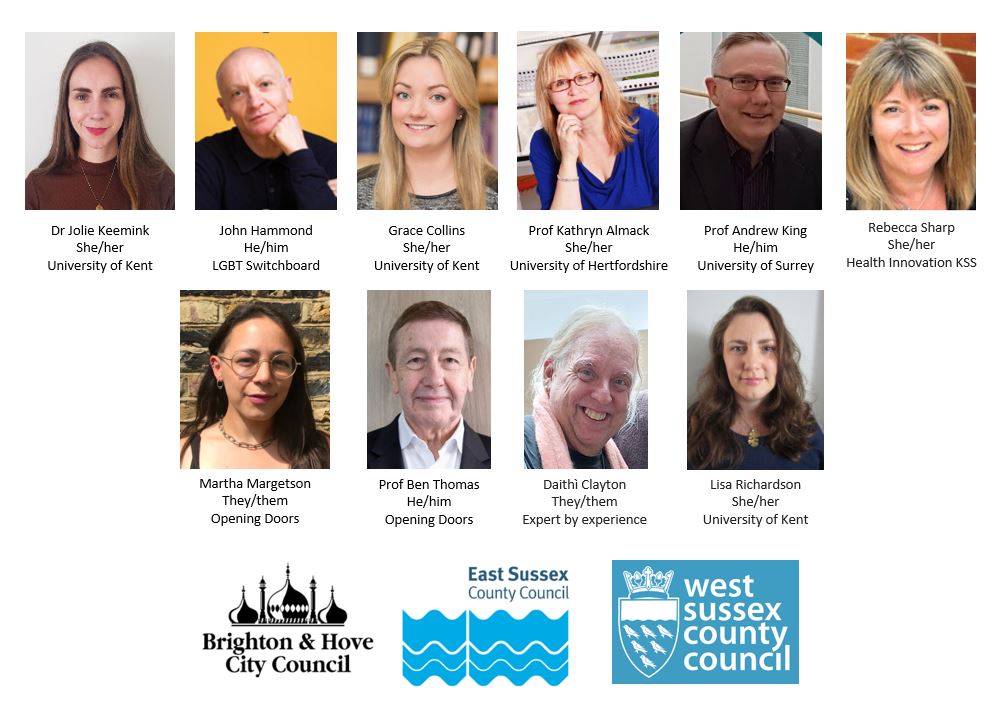A research project aiming to understand how providers of residential care for older people can improve their LGBTQ+ inclusive care offer
Dr Jolie Keemink, Principal Investigator
 Why is this project needed?
Why is this project needed?
The CIRCLE study (2022-2024) was developed to address the issue that many older LGBTQ+ people face significant barriers and inequalities when engaging with social care services in The UK. LGBTQ+ stand for lesbian, gay, bisexual, trans, queer, and other marginalised sexual orientations and gender identities. Previous research shows that care providers severely disregard LGBTQ+ identities and relationships, as well as their relevance for care needs. As a result, the older LGBTQ+ population has become invisible, are hesitant to access to services, and face poorer health outcomes than their heterosexual and cis-gender counterparts. Care providers lack the skills and confidence to improve their LGBTQ+ inclusive care offer.
The CIRCLE project builds on previous research conducted in similar care settings, and extends this by examining different ways of supporting residential care providers to be more inclusive for LGBTQ+ residents.
What is LGBTQ+ inclusive care and why is it important?
By LGBTQ+ inclusive care, we mean the following:
- Access to care and resources that is equal and equitable to cis-gender and heterosexual people.
- An environment in which people’s differences in sexual orientation and gender identity are valued and celebrated.
- Acknowledging that sexual orientation and gender identity are relevant to care needs.
- Facilitating full participation in the care environment.
- Discrimination and intolerance are addressed and eradicated.
There are at least 1 million people over the age of fifty who identify as LGBTQ+. These generations have lived through decades of discriminatory policies and laws that have severely impacted their confidence in public services. These policies and laws have led to trauma, stress, and internalised stigma for the LGBTQ+ community, which may have significant health implications. Additionally, because of these experiences, there is an increased need for explicit LGBTQ+ inclusive services to signal people are safe to be themselves.
LGBTQ+ people may also have other increased risk factors for mental and physical health issues, such as dementia and depression. These risk factors include stress, social isolation, loneliness, HIV, and addiction. It is therefore vitally important that health and care professionals are aware of the relevance of LGBTQ+ identity for care needs in order to provide optimal care. LGBTQ+ people are also more likely to live alone and to not have access to the traditional informal family support many heterosexual and cis-gender people do have available. This increases the likelihood for the need for formal health and social care support.
Taken together, it is evident that LGBTQ+ inclusion should be considered in care settings to ensure that older LGBTQ+ people receive equitable access to good, personalised care.
How are we supporting residential care providers?
We are using three different ways to support residential care providers with LGBTQ+ inclusion. The project evaluates how well these ways work to improve LGBTQ+ inclusive care. Firstly, we are implementing the Pride in Care programme in five care homes across Sussex. Developed by Opening Doors, the largest voluntary organisation in the UK supporting LGBTQ+ people over 50, Pride in Care is a comprehensive programme assessing different elements of LGBTQ+ inclusion. It also provides recommendations for improvements. It assesses staff attitudes, organisation policies, and communication and marketing materials. The CIRCLE study evaluates whether Pride in Care works well in a care home setting and if it is effective at improving the LGBTQ+ inclusive care offer.
Secondly, we organise quarterly online Community of Practice meetings. The meetings are open to anyone working in adult social care who wants to learn more about LGBTQ+ inclusion in residential care. In each meeting, we invite experts and interactively discuss a different element of LGBTQ+ inclusion in care. As part of the CIRCLE study, we are evaluating the impact of the meetings.
Thirdly, together with a group of older LGBTQ+ people and care home managers, we are co-designing a free resource for care homes. The resource will offer actionable steps that are easy to implement that will help make the care home environment more LGBTQ+ inclusive. The resource will be launched in June, Pride month.
The CIRCLE care home guide
As part of the CIRCLE project, we developed a free guide for care homes that offers practical tips on how to make your care more inclusive for LGBTQ+ older people. The guide was co-designed by older LGBTQ+ people and care home staff. You can access downloadable versions of the guide here.
Updates, Events & Outputs
- Community of Practice 6 – 19th June 2024
In this Pride month edition, we will discuss Queer Joy, what queer joy means for older LGBTQ+ people, and how care settings can celebrate queer joy. We are joined by Dr Lexi Webster who will speak about their research on queer joy. Sign up here. - Community of Practice 5 – 16th April 2024
We were joined by Dr Mark Wilberforce who spoke about the value-based recruitment tool he developed for his project Curious about Care. We considered how care homes, when recruiting staff, can ensure that prospective members of staff will practice LGBTQ+ inclusive care. - Community of Practice 4 – 25th January 2024
At this meeting, we were joined by members from the CQC LGBTQ+ network. They presented on the importance of LGBTQ+ inclusion from a CQC standpoint and what the network is doing to promote LGBTQ+ inclusion. - Community of Practice 3 – 23rd November 2023
We hosted Professor Trish Hafford-Letchfield present on the LGBTQ+ learning framework she developed with Skills for Care. After learning more about the framework, we split into smaller breakout groups with key themes and discussed before rejoining and presenting our thoughts back to the larger group. - Community of Practice 2 – 27th September 2023
In this meeting, we watched a recent news article about LGBTQ+ abuse in care homes and then split into smaller groups to discuss the article. Please note, this video could be emotional for people to watch. - Community of Practice 1 – 25th May 2023
For our first session we had presentations from Jolie covering all aspects of the CIRCLE project, and from Martha from Opening Doors who spoke about the Pride in Care programme. This was then followed by live interviews with experts by experience who were discussing ‘why is LGBTQ+ inclusion important?’.
Team & Contact

If you want to know more about the project, please contact Jolie on j.r.keemink@kent.ac.uk
Funding
The CIRCLE study is funded by the NIHR ARC KSS – Priorities for Care funding call